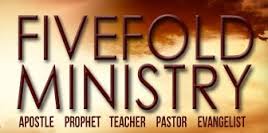 Why Should/Shouldn’t My Church Embrace Change? Part VI
Why Should/Shouldn’t My Church Embrace Change? Part VI
Should we envision evangelists, shepherds, teachers, prophets, and apostles of Ephesians 4:11 as church offices and leadership titles, or are they diverse passions, desires, and points of view found in common believers in Jesus Christ?
Ephesians 4:7 & 8 reads, “7 But to each one of us grace was given according to the measure of Christ’s gift. 8 Therefore it says, ‘When He ascended on high, He led captive a host of captives, and He gave gifts to men.’”
He gave ”gifts to men’” to equip the saints for works of service. These saints will worship by giving back their gifts to the Lord and to other saints that will build up the body of Christ to attain unity of the faith and acquire the knowledge of the Son of God, to mature the brethren into the fullness of Christ. . That’s receiving and giving; that’s being fluid.
The gift of evangelism became prevalent in the 1950’s as “You must be born again” became a popular theme, but the church opted to train their clergy to become professional evangelists rather than equip the saints to evangelize.
The 1960’s introduced communal living as believers tried to nurture and care for one another, but five respected Christian pastors formed the Fort Lauderdale Five in an effort to bring stability. Instead their influence became too controlling and dictating for which they had to repent of spiritual abuse.
The 1970’s was the decade of the teacher, and I think every professional clergy thought of himself as a teacher whose cassettes and CD’s could be purchased. Unfortunately the laity who bought all those tapes, did all those Bible studies, and earned Biblical degrees became frustrated when the clergy refused to give up their pulpit or gave them no outlet to release their teaching voice or passion.
The prophetic movement of the ‘80’s began as a grass root movement among believers but quickly turned to super pastors now not only being evangelists and teachers but also prophets. Again the prophetic voice among the laity became silent.
By the end of the century, many mega-church pastors, overseers, and bishops bestowed the title of apostles because they oversaw networks of independent churches or denominations. I have never met one of these apostles who were laity because only clergy were qualified, yet I have met many believers who see the big picture of the Church and network believers in serving one another.
The purpose of the five fold, “for the equipping of the saints for the work of service,” has been lost. A fluid, fivefold church would have emphasized giving and receiving among the saints. One’s weakness is another’s strength. All five NEED to RECEIVE from EACH OTHER and GIVE to ONE ANOTHER. The fluidity of giving and receiving is central to building relationships through the five fold.
 I ask, “Who is your church investing in?”
I ask, “Who is your church investing in?”
The data of your local church budget will reveal that answer. Most church budgets support the building and maintenance, and salaries and professional development for staff, and program needs. It feeds the organization, not builds up the organism, the believers. Is your church investing in you and your fellow believers or in the building, programs, and the professional staff?
The five fold is about relationships which bring Jesus into believer’s lives. It is for birthing, feeding, nurturing, and caring for the organism through “service”, not for keeping the organization solvent and running smoothly.